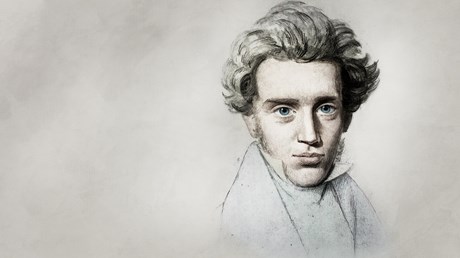How the Danish philosopher takes an idea that’s congenial to modern ears and turns it upside down.

Protestants don’t have saints. Or at least we claim we don’t. But if we consulted our eyes, fingers, and hearts, they would tell us otherwise. Perhaps we don’t own up to having saints because we worry it might impugn our identity, which is often anchored in the notion that we are those who resist and protest the ways of our elder brothers and sisters in Rome. But no matter what our minds tell us, our eyes, fingers, and hearts tell the truth. We are closet saint-admirers.
Which writer do you read when you are existentially famished? Whose thoughts do you continually find yourself pondering while putting away the dishes? Whose words do you break down and repeat with thrill and delight? Whose life inspires you? Who makes you want to be a better human being? That’s your saint. One of mine is the Danish philosopher and theologian Søren Kierkegaard.
Ever since Kierkegaard’s writing was introduced to an American audience (through the translations of Walter Lowrie, David Swenson, and Howard and Edna Hong), we’ve seen a near-bottomless amount of scholarship focusing on Kierkegaard the Philosopher. And over the past decade or so, the theme of Kierkegaard as Theologian has received a good deal of attention.
With the release of Kierkegaard and Spirituality: Accountability as the Meaning of Human Existence—the newest volume in the “Kierkegaard as Christian Thinker” series from Eerdmans press—C. Stephen Evans has hopefully opened up a new chapter in Kierkegaard studies: Kierkegaard the Spiritual Director. Evans, who teaches philosophy at Baylor University, brings philosophical grit and pastoral sensitivity to this book, making it a work on spiritual formation with a spine. ...
from Christianity Today Magazine https://ift.tt/2CLspDG
No comments:
Post a Comment